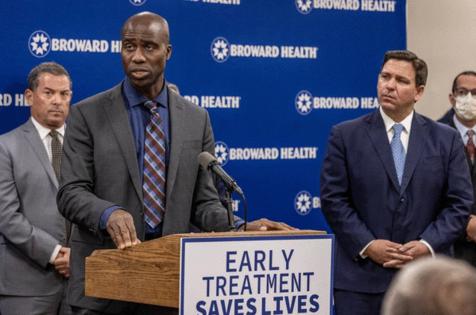With strong Senate support, Florida moves closer to statewide fluoride ban
Published in News & Features
Florida is on its way to becoming the second state in the country to ban adding fluoride to public drinking water, parting with a practice once regarded among the greatest public health achievements of the last century.
The Republican-controlled state Senate approved a wide-ranging agricultural bill Wednesday that includes a provision ceasing fluoridation by cities and counties. The vote was 27-9.
The bill now goes to the Florida House, which is also GOP-controlled and where similar legislation has received favorable votes in committee. If approved, it would then head to Gov. Ron DeSantis’ office, who almost certainly would sign the prohibition into law.
“We’re here to hydrate, not medicate,” said state Sen. Keith Truenow, R-Tavares, who sponsored the bill, before the vote. “Here in Florida, we are saying no additives can be used in purifying water.”
Opponents of a statewide ban said it would lead to more tooth decay and other health issues, especially among young children in poor communities.
“This would honestly be a joke, if it didn’t have dangerous consequences,” said Tina Scott Polsky, D-Boca Raton, on the Senate floor before voting against the bill. “Are any of us chemists? None of here are doctors. None of us are dentists.”
The Florida Senate’s move follows Utah, which became the first state last month to enact its ban. The state did so just weeks after Robert F. Kennedy Jr. — who has long expressed suspicion about the safety of water fluoridation — became secretary of Health and Human Services.
Ending fluoridation, once a fringe issue, has gained increasing support across Florida after state Surgeon General Joseph Ladapo last August spoke against injecting the cavity-fighting mineral into drinking water. He pointed to a study that found fluoride is linked to lower IQ in children.
Ladapo also has argued that adding fluoride to public water is no longer necessary because toothpaste and mouthwash provide protection against tooth decay.
However, health experts say the studies Ladapo cites regarding toxicity involve fluoridation at much higher levels than what is allowed in public water systems in the United States, roughly 0.7 parts per million — about three drops in a 55-gallon barrel of water.
The National Institutes of Health has said it is “virtually impossible” to get toxic levels of fluoride from water with that amount of fluoride.
The American Dental Association has said that Ladapo was “misinformed and making dangerous” comments. The organization also pointed out that toothpaste supplements fluoridated water for good dental health.
Since 1945, fluoride — a mineral naturally found in water and the soil — has been added to public drinking water systems across the country after it was discovered it helped prevent cavities and help prevent other forms of tooth decay.
Health experts and agencies — including the American Dental Association, American Academy of Pediatrics and Centers for Disease Control and Prevention — have endorsed fluoridation as a way of providing poor children with a measure of dental care, who otherwise could not afford to go to a dentist.
But in the past several months, at least 14 Florida cities have agreed to discontinue fluoridation — including Lake Mary, Longwood, Tavares and Leesburg.
Last week, Seminole County became the largest utility provider in Central Florida to stop adding fluoride to its drinking water supply before distributing it to roughly 40,000 customers.
In a 4-1 vote, Seminole commissioners made the move after several people spoke against fluoridation at recent meetings. However, several health professionals strongly urged Seminole’s leaders to continue it.
Today, only about one sixth of Florida’s 23 million residents live in communities without fluoride in their water.
It’s unclear whether the proposed legislation would apply to private utilities, such as neighborhoods with their own water distribution systems. According to the bill, the use “of any additive in a public water system” that does not improve water quality or remove contaminants would be prohibited.
_____
©2025 Orlando Sentinel. Visit orlandosentinel.com. Distributed by Tribune Content Agency, LLC.







Comments